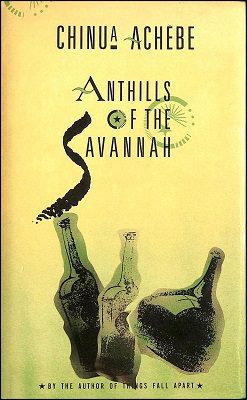 First edition cover | |
| Author | Chinua Achebe |
|---|---|
| Language | English |
| Genre | Literary Fiction |
| Set in | Kangan (fictional country) |
| Publisher | Heinemann |
Publication date | 1987 |
| Media type | |
| ISBN | 978-0-385-26045-9 |
| OCLC | 19932181 |
| Preceded by | A Man of the People |
| Followed by | There was a Country: A Personal History of Biafra |
Anthills of the Savannah is a 1987 novel by Nigerian writer Chinua Achebe. It was his fifth novel, first published in the United Kingdom 21 years after Achebe's previous one ( A Man of the People in 1966), and was credited with having "revived his reputation in Britain". [1] A finalist for the 1987 Booker Prize for Fiction, Anthills of the Savannah has been described as the "most important novel to come out of Africa in the [1980s]". [2] Critics praised the novel upon its release.